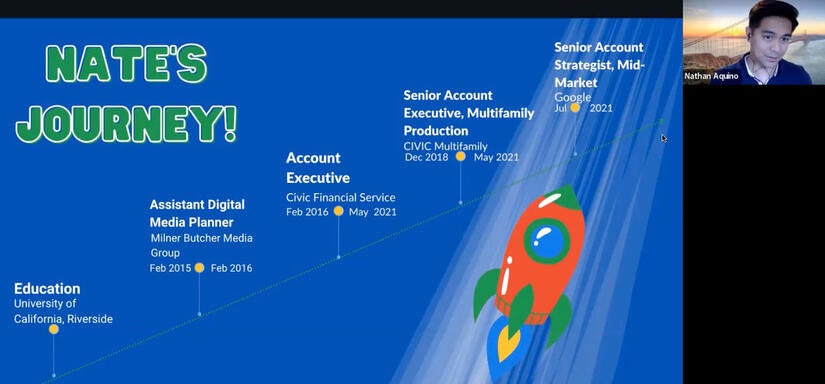
In a career that has taken him from a small digital advertising agency to senior account strategist role at Google, Nate Aquino ’14 has learned that personal communication skills are critical – even in an industry that prizes technical know-how.
“I think when a lot of people hear ‘communication,’ they think ‘talking,’ being a good speaker,” Aquino said during a recent presentation to Graduate Student Ambassadors. “But I think half of communication is being silent. The No. 1 thing is being an active listener.”
Aquino said he has learned the importance of tailoring a message to a specific audience: “If Im writing an email to a managing director here at Google, I’ve got to be quick and concise. Nothing more than three bullet points, each bullet point less than six words.”
With that advice in mind, here are three bullet points paraphrasing advice that Aquino shared in his virtual discussion with Graduate Student Ambassadors:
- Be authentic in every conversation.
- It’s OK to ask for help.
- ‘Imposter syndrome’ is real. Use it.
Networking, learning, adapting
Aquino was born in Guam and his family moved to California when he was 13. After graduating UCR as a political science major, he gained an interest in advertising and marketing by watching “Mad Men.” His first job was nothing like that TV series, but it taught him all about digital marketing.
“I came to realize advertising’s all about data,” he said. He enjoyed interacting with clients and wanted to move more into a sales role, so he started networking. That landed him a job at a financial startup, where he advanced in responsibilities, closing multimillion-dollar deals.
Then came the pandemic and its hit on the financial markets. The technology sector, meanwhile, was booming amid the demand for virtual connections, which is how he landed a job at Google, where his job is “really to make sure that our clients using Google are successful.”
That goes beyond sales. “I have to dissect their overall user journey from click to purchase,” he said. “Its quasi-salesperson, its quasi-business consultant, and its quasi-solutions engineer.”
Despite the need for technical skills in the role, his favorite part of the job is building relationships, Aquino said.
“Just being able to sit at the table with different stakeholders is a huge skill to have. If you come to the table authentically and truly invested in that stakeholder and what they're saying, I think that goes much further than knowing everything.”
Why you don’t need to know everything
One of the hallmarks at Google, he said, is the belief that “resourcefulness is better than retention” – meaning it’s more important to get help finding a solution than trying to memorize everything.
“So, I've kind of created my board of directors, people who I can go to for specific topics,” Aquino said. “When you do need help with a specific topic, you can just pick up the phone. I think just finding your board of directors is super important.”
Having that network of advisers was important because the learning curve was steep when he arrived at Google, he said.
“The imposter syndrome I felt was unlike any other, because everyone is so darn smart at Google,” Aquino said. “But acknowledging it is Step One in overcoming that obstacle, because everyone has imposter syndrome, right? As I said before, being authentic about it and being OK with not knowing things, asking questions, and asking for help and looking for resources – it’s all part of getting over imposter syndrome.
“And if you don’t have imposter syndrome, you’re not working hard enough or you’re not going for a goal that’s big enough for you because you’re too comfortable. If you’re feeling unsure, that means the opportunity’s worth it.”
